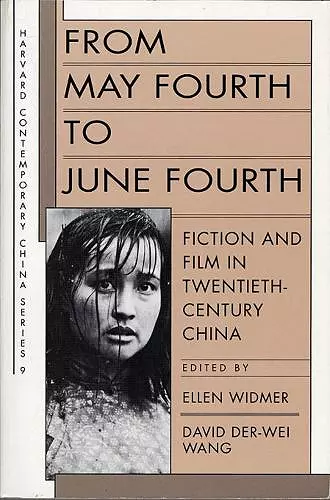From May Fourth to June Fourth
Fiction and Film in Twentieth-Century China
David Der-wei Wang editor Ellen Widmer editor
Format:Paperback
Publisher:Harvard University Press
Published:31st Jan '93
Currently unavailable, and unfortunately no date known when it will be back

From May Fourth to June Fourth will he warmly welcomed. It should be of great interest to all concerned with literary developments in the contemporary world on the one hand, and on the other with the enigmas surrounding China's alternating attempts to develop and to destroy herself as a civilization. -- Cyril Birch University of California, Berkeley
What do Chinese literature and film inspired by the Cultural Revolution (1966–1976) have in common with media of the May Fourth movement (1918–1930)? This book demonstrates several shared aims: to liberate narrative arts from aesthetic orthodoxies, to draw on foreign sources for inspiration, and to free individuals from social conformity.
What do the Chinese literature and film inspired by the Cultural Revolution (1966–1976) have in common with the Chinese literature and film of the May Fourth movement (1918–1930)? This new book demonstrates that these two periods of the highest literary and cinematic creativity in twentieth-century China share several aims: to liberate these narrative arts from previous aesthetic orthodoxies, to draw on foreign sources for inspiration, and to free individuals from social conformity.
Although these consistencies seem readily apparent, with a sharper focus the distinguished contributors to this volume reveal that in many ways discontinuity, not continuity, prevails. Their analysis illuminates the powerful meeting place of language, imagery, and narrative with politics, history, and ideology in twentieth-century China.
Drawing on a wide range of methodologies, from formal analysis to feminist criticism, from deconstruction to cultural critique, the authors demonstrate that the scholarship of modern Chinese literature and film has become integral to contemporary critical discourse. They respond to Eurocentric theories, but their ultimate concern is literature and film in China’s unique historical context. The volume illustrates three general issues preoccupying this century’s scholars: the conflict of the rural search for roots and the native soil movement versus the new strains of urban exoticism; the diacritics of voice, narrative mode, and intertextuality; and the reintroduction of issues surrounding gender and subjectivity.
From May Fourth to June Fourth will be warmly welcomed. It should be of great interest to all concerned with literary developments in the contemporary world on the one hand, and on the other with the enigmas surrounding China’s alternating attempts to develop and to destroy herself as a civilization. -- Cyril Birch, University of California, Berkeley
ISBN: 9780674325029
Dimensions: 229mm x 152mm x 30mm
Weight: 703g
464 pages